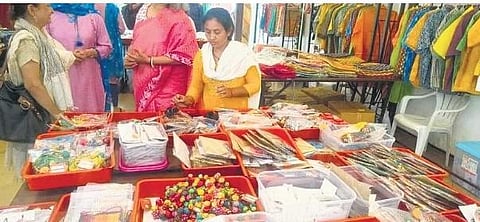

GUJARAT: Sahaj India, an NGO founded in 1990 by Jabeen Jambughodawala in Dahod district in the eastern part of Gujarat, has empowered 18,000 tribal women ever since its establishment.
Dahod tops the chart with the highest poverty headcount ratio of 38.27 per cent according to NITI Aayog’s ‘National Multidimensional Poverty Index’ report released in July 2023. This is one of the reasons why women belonging to the Bhil tribal community here migrate to other cities in search of work, along with their husbands who work as agricultural or construction workers.
Jabeen, now aged 55, grew up in the Vora family in Dahod. As a youngster, she dreamt of joining the civil services because of her strong desire to create employment opportunities for tribal women in her hometown, so that they would stop migrating to farther cities with their men. She believed their children would be able to continue their education if they didn’t have to migrate.
Reflecting on her three-decade journey, Jabeen recollects an encounter she had with a pregnant woman carrying two pots of water on her head. “I was taken aback and asked her why she was working in such a vulnerable state. ‘We are accustomed to this way of life,’ the woman replied. I knew that with the dry spell that was to come, they would relocate to other towns and work as construction labourers. Many women in my village have even given birth on the roadside,” said Jabeen, who added that this forced her to think about these women.
“I asked the woman that if she truly desired to work, she should consider tasks that can be done from home. ‘Who would provide such work, and what kind of work,’ she asked me. These questions sparked an idea in my mind: if we can offer home-based jobs to tribal sisters, it will encourage tribal women, their husbands and their children to stay here rather than migrating elsewhere,” said Jabeen.
“While observing these women, I noticed their beautiful glass bead necklaces. It dawned on me that these necklaces would sell well in cities like Baroda, especially during Navratri. So, I asked the women if they could make and sell these necklaces. They laughed and said it was a difficult process, and each piece took several days to make. I also learned that these tribal women didn’t use needles for beading. Instead, they used soap to harden the thread,” explained the Sahaj founder.
Various tribes have their unique symbols and shapes that are employed in the creation of jewellery. In 1990, Jabeen had a collection of necklaces, beaded dupattas and tops made by tribal women. She showcased them at an exhibition in Maharaja Sayajirao University of Baroda, capturing the interest of students. Jabeen then dedicated herself to empowering tribal women by assisting them in accessing various government programmes. This led to the establishment of Sahaj India. Under the Bombay Trust Act, Sahaj India officially became an NGO in 2001.
In 1990, Jabeen began working with 14 women from two villages in Dahod — namely, Sahada and Bhamatalai. By 1992, the organisation had 245 women. Today, the NGO collaborates with 5,000 women from Dahod, Chhota Udepur and Narmada districts. Together they create and sell a wide range of products, including jewellery, accessories, home décor items, stationery and utility products under the Sahaj brand, in India and abroad.
“We work directly with 500 women, and about 4,500 women who have been trained by Sahaj are micro-entrepreneurs in our various projects. Since our establishment, we have educated around 18,000 women,” said Jabeen. Lalita Chauhan, hailing from Dabhda village of Limkheda taluk in Dahod, is one such woman. Her family relied on agriculture for livelihood; in difficult times, they used to migrate to cities in search of labour.
“This job has brought great independence to my family. I am delighted that I can support my husband’s treatment without relying on anyone’s charity. Even when I need to borrow money, it is based on trust and not on pity. It is empowering to be treated with dignity,” beamed Lalita.
Sonal Bilwal, a resident of Delsar, has had a life-altering transformation since joining Sahaj in 2006. “In just six months of training in my village, I learned the art of beadwork. Now, I have a ‘pakka’ house, my children are in school, and we’re even planning to open a ‘kirana’ shop for my husband this year. Our village has become much more prosperous and stable,” said Sonal.
The women craftsmen receive kits and designs from Sahaj’s main office in Dahod, where skilled craftsmen create designs based on market demand. The women then work on these prototypes at home. One woman would serve as the local coordinator and bring the group’s work to the office. These tribal women artisans dedicate 3-4 hours daily to the task and earn approximately `5,000 per month.
Their exquisite handmade products are sold at exhibitions across India by the Tribal Cooperative Marketing Development Federation of India. They are also sold in large quantities by exporters in the US, UK, Australia and other nations.